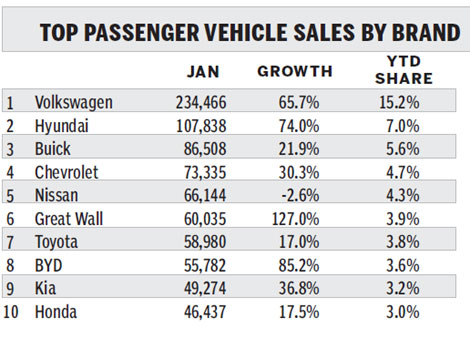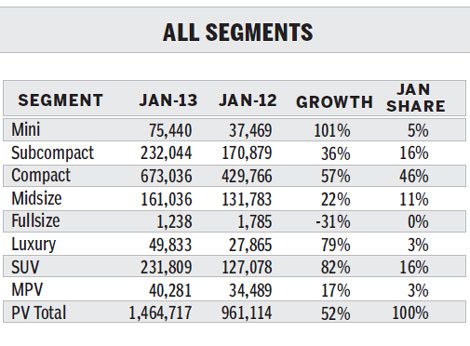Crucial segment
Industry insiders say government procurement is crucial for Roewe to elevate its brand image and help its sales in the country's highly competitive passenger vehicle market.
SAIC Passenger Vehicle Co delivered just 200,000 of the 13.2 million cars sold in China last year, 128,000 of them the Roewe brand and the r est carrying the MG badge.
Audi's rise in China was largely the result of its early dominance as the car used by high-ranking government officials.
In 2011, the central government issued a new regulation on government car procurement that said cars used by officials lower than deputy minister level should cost less than 180,000 yuan and have engines smaller than 1.8 liters. Higher officials are allowed cars costing up to 450,000 yuan.
Last year the Ministry of Industry and Information Technology released a catalog of permitted new government cars, with all 400 models listed from domestic brands.

Higher aspirations
During the Beijing Auto Show last April, major domestic auto groups showcased their independently developed high-end models such as the Roewe 950 from SAIC, the Hongqi H7 from FAW and the C70G from BAIC.
Among the 120 new models that premiered, 84 were independently developed by domestic brands, most of them for the middle or upper segments of the market.
Following the central government's clampdown on extravagance this year, provincial authorities have already begun to switch from foreign-brand vehicles.
Shenzhen Party chief Wang Rong rides in a BYD E6, while Guangzhou Mayor Chen Jianhua uses a GAC Trumpchi.
The provincial and regional governments of Gansu, Hunan, Xinjiang and Ningxia recently issued regulations requiring their officials to choose domestic brands when replacing official cars.

But industry insiders still question the prospects of domestic brands in the government procurement market.
"Because all the regulations - either from the central or local governments - are not compulsory, domestic brands are not likely to take a large share in the government procurement market," said Xu Changming, director of the information center at the National Reform and Development Commission.
Statistics show that foreign brands had 90 percent of the government procurement market before 2010.
In 2008, the central and local governments spent about 80 billion yuan on cars, a figure that rose to more than 100 billion yuan in 2011 when domestic brands accounted for about 20 percent of the sales, mostly to county or township officials.
"Although (the domestic share) represents a lot of money, it is not that much when divided up by more than 10 local brands," said an executive at GAC Trumpchi.
"The real meaning for domestic brands to compete in government procurement is to elevate their brand image."
xuxiao@chinadaily.com.cn
